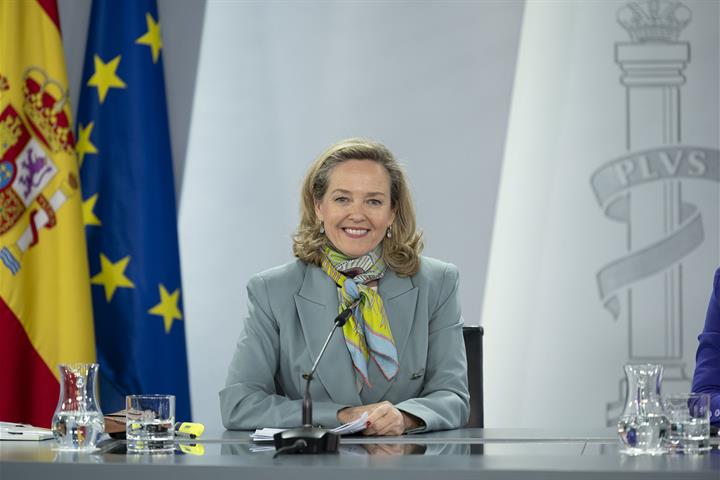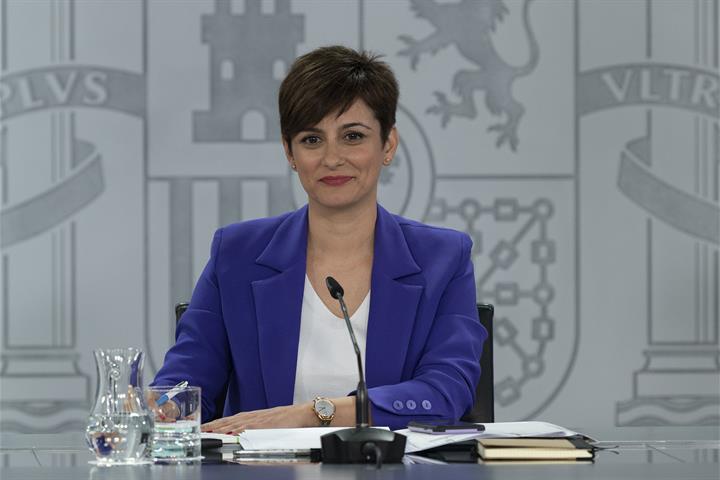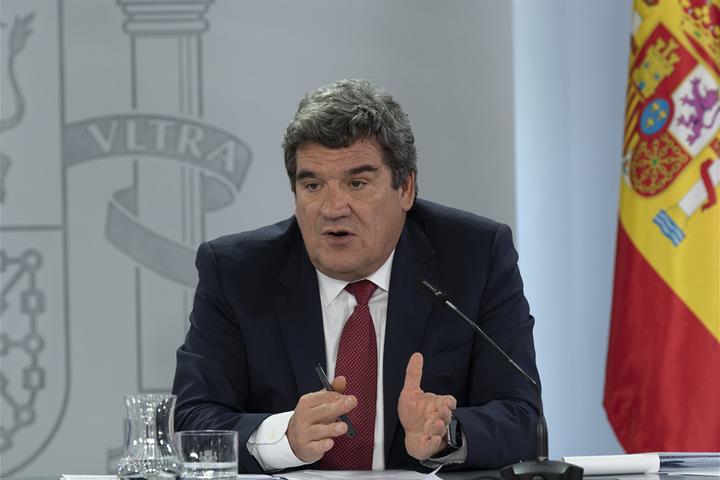Council of Ministers
The Government of Spain extends the Iberian mechanism limiting gas prices and approves the Families Act
Council of Ministers - 2023.3.28
Moncloa Palace, Madrid
The Council of Ministers has approved the extension of the Iberian solution and the launch of the RETECH Programme, two initiatives "currently of particular importance", according to the First Vice-President and Minister for the Economy and Digital Transformation, Nadia Calviño.
Calviño stressed that despite "a particularly complex international context, with intense geopolitical tension, inflationary tensions, a rapid rise in interest rates and volatility in the financial markets", the Spanish economy is continuing to grow strongly and shows "notable strength".
The vice-president also highlighted the "excellent performance of the labour market, thanks to the strong activity and the labour reform". The number of national insurance contributors now exceeds 20 million, up from less than 19 million in mid-2018, with a notable increase in high value-added sectors, such as those linked to digitalisation.
Boosting innovation
Along the same lines, the government has approved the launch of 13 RETECH projects, promoted by 18 autonomous communities and cities to create technological innovation networks. These projects come in addition to the three already launched in the field of cybersecurity.
A total of €500 million euros will be mobilised, mostly from the NextGenerationEU funds, to promote public-private collaboration projects such as the Agri-Food Network Platform and others relating to artificial intelligence, tourism, industry and entrepreneurship.
Safety net against possible gas spikes
 The First Vice-President of the Government of Spain and Minister for the Economy and Digital Transformation, Nadia Calviño, at the press conference after the Council of Ministers | Pool Moncloa/Borja Puig de la Bellacasa
The First Vice-President of the Government of Spain and Minister for the Economy and Digital Transformation, Nadia Calviño, at the press conference after the Council of Ministers | Pool Moncloa/Borja Puig de la Bellacasa
The first vice-president explained that another differentiating factor in this economic cycle is the strength of the foreign sector, which is evolving very positively thanks to the competitiveness of the Spanish economy and the effectiveness of the measures implemented in the field of energy, which have enabled energy costs to be reduced.
Among the measures taken to contain the inflation caused by the war in Ukraine, the so-called Iberian solution is likely the one with the greatest impact, as explained by Nadia Calviño. Following intense work with the European Commission, the Council of Ministers has approved the extension of this mechanism until 31 December of this year, enabling the decoupling of the evolution of the price of electricity from the price of natural gas.
Since it came into operation on 15 June 2022 and until the end of January this year, the mechanism resulted in savings of more than €5.1 billion for all electricity consumers. The measure benefits domestic consumers, SMEs, the self-employed and large industry alike. The vice-president assured that in the current context in which natural gas prices are below the reference price of the Iberian solution, the extension "gives us above all a safety net for consumers should natural gas prices rise again between now and the end of the year".
Fiscal responsibility and banking union
Nadia Calviño also reiterated that one of the basic axes of economic policy is fiscal responsibility. "We are taking advantage of the strong growth and the extraordinary evolution of employment to advance in fiscal consolidation towards a reduction of deficit and public debt ratios", she stated.
The vice-president also referred to the current scenario in the international financial markets, which is marked by the rapid rise in interest rates and the deterioration of the situation of some medium-sized banks in the US.
"The authorities of the affected countries have reacted quickly and forcefully to avoid any contagion, and the governor of the Bank of Spain has spoken loud and clear to confirm the strength of Spanish banks, which have even higher levels of solvency and liquidity than other European countries," she said.
Calviño advocated "maximum produce" in financial institution and fiscal and monetary policy authority actions, and that European banking union should be finalised "as soon as possible", as "one of the issues that will be very important during the Spanish presidency in the second half of the year".
Comprehensive support for different family models
 The Government Spokesperson and Minister for Territorial Policy, Isabel Rodríguez, during her speech at the press conference after the Council of Ministers | Pool Moncloa/Borja Puig de la Bellacasa
The Government Spokesperson and Minister for Territorial Policy, Isabel Rodríguez, during her speech at the press conference after the Council of Ministers | Pool Moncloa/Borja Puig de la Bellacasa
The Council of Ministers has approved the Draft Law on Families, a text that is part of the commitments of the Recovery, Transformation and Resilience Plan. The Minister for Territorial Policy and Government Spokesperson, Isabel Rodríguez, stressed that it is one of "those reforms that never loses sight of the social perspective".
The law expands legal recognition of the diversity of different family models and sets out a comprehensive policy to support family and child welfare. Among the main new additions, it creates three additional leaves of absence: a five-day care leave per year; an eight-week parental leave until children reach the age of eight; and a force majeure leave that can be distributed by hours and can reach up to a total of four days per year.
The government spokesperson also pointed out that the text includes initiatives aimed at motherhood and support for parenting. It extends the families who are eligible for an income of €100 per month for the first three years of the child's life, especially in the case of mothers who are receiving benefits or who have worked for at least 30 days since the baby's birth. It also includes the boost that public administrations, and especially the competent ones, must give to ensuring that education for 0-3-year-olds is universal and free of charge.
Fighting child poverty
Likewise in the area of social services, the government has distributed €198 million among the autonomous communities for family protection and attention to child poverty programmes.
Isabel Rodríguez outlined that they are aimed at projects to improve the situation of vulnerability of families with dependent minors; to support the reconciliation of family and work, to guarantee basic rights to food, leisure and culture for children and adolescents; and to strengthen the network of primary care social services.
Report on the impact of pension reform
The government has analysed a report on the current situation of the pension system after the approval, during the legislature, of the reforms committed to in this area in the Recovery, Transformation and Resilience Plan.
The Minister for Inclusion, Social Security and Migration, José Luis Escrivá, explained that the modernisation of the system is based on the 22 recommendations approved by the Toledo Pact in November 2020, with a threefold objective: to guarantee the sufficiency of pensions; to reinforce the equity and solidarity of the system; and to ensure its sustainability in the short, medium and long term.
Escrivá reviewed the regulatory changes made since 2021: approval of the gender gap in February 2021; the law guaranteeing the purchasing power of pensioners; the measures to promote employment plans; the implementation of the new system for self-employed workers; and the Royal Decree-Law that establishes a dual model for the calculation period. In short, these initiatives strengthen sustainability and a new framework for the revaluation of minimum pensions.
 The Minister for Inclusion, Social Security and Migration, José Luis Escrivá, at the press conference after the Council of Ministers | Pool Moncloa/Borja Puig de la Bellacasa
The Minister for Inclusion, Social Security and Migration, José Luis Escrivá, at the press conference after the Council of Ministers | Pool Moncloa/Borja Puig de la Bellacasa
The report shows that the revaluation of the purchasing power of pensions in line with the Consumer Price Index avoids a massive cut in pensions that could reach 35% in the case of some pensioners, according to the minister. Furthermore, Escrivá stated that capacity to meets the needs of the most vulnerable pensioners has been strengthened, and the gender gap reduced. In this respect, she announced that 432,000 people, 93% of whom are women, receive the supplement for the reduction of the gender gap.
With regard to the fairness of the system, Escrivá pointed out that the modification of the self-employed system means that two out of three self-employed workers can now pay a lower quota than previously. The reform also includes improvements for people whose careers have taken an irregular path, and benefits young people by replacing the Sustainability Factor with the Intergenerational Equity Mechanism. "For the youngest, the reform as a whole means that they will have a much higher pension than they would have had if the repealed rule had remained in force," he said.
Regarding the sustainability of the system, José Luis Escrivá recalled that progress has been made in the process of separating sources, such that part of the social security system's non-contributory expenses have been transferred to the General State Budget. He also highlighted the favourable evolution of the labour market, which means more national insurance contributors and a reduction in the social security deficit.
Sustainability, he argued, is also reinforced through voluntary incentives such as delayed and early retirement. "The right to retire at the legal age or even early is perfectly legitimate and is taken by those who have that option", he said. There are other people who, if they want to extend their retirement age voluntarily because of their state of health and their life preferences, can do so, and with incentives, helping the sustainability of the system".
Escrivá added that all the reforms of the system are the outcome of social dialogue and very broad agreements. Furthermore, he concluded that it is an extraordinarily rigorous reform from a technical point of view, it will be an international benchmark for future reforms, and it generates enormous certainty and social cohesion. "It is a reform that is overwhelmingly oriented towards the great social majority and conveys to our pensioners that their purchasing power is permanently guaranteed", he said.
Other agreements of the Council of Ministers
The government has officially convened the local elections and the elections to the Ceuta and Melilla assemblies for 28 May, which the government spokesperson has described as "very important", since "municipalism has been an essential pillar in the consolidation of democracy and the increase in the quality of life of Spaniards".
In addition, the government has earmarked €24 million for the Erasmus+ programme, which complements non-formal training; €20 million for the cultural capital of Barcelona; and €15 million for the competitive process for Visitor Services and Security at the Prado Museum.
Non official translation




